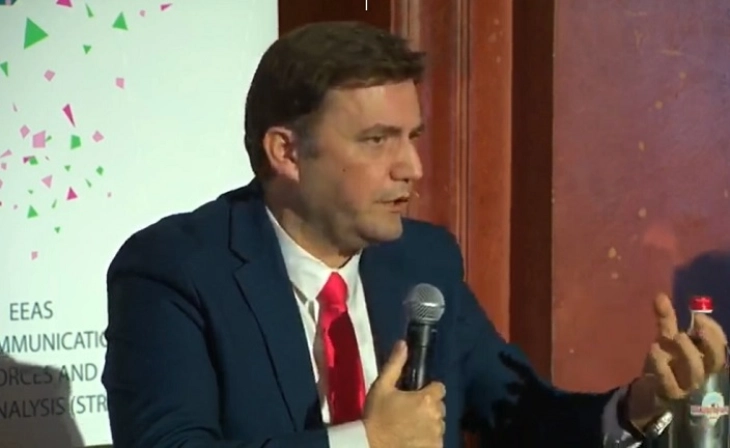Citizens being put to 'fundamental test' at upcoming elections, says Osmani
- The political landscape in North Macedonia has never been as polarized as it is ahead of the upcoming presidential and parliamentary elections, creating two camps – pro-European and anti-European front, said Foreign Minister Bujar Osmani on Tuesday in Brussels in his address at the “Beyond Disinformation: Strengthening our societies against Foreign Information Manipulation and Interference” conference, hosted by the High Representative of the European Union for Foreign Affairs and Security Policy, Josep Borrell.
- Post By Angel Dimoski
- 21:44, 23 January, 2024

Brussels, 23 January 2024 (MIA) – The political landscape in North Macedonia has never been as polarized as it is ahead of the upcoming presidential and parliamentary elections, creating two camps – pro-European and anti-European front, said Foreign Minister Bujar Osmani on Tuesday in Brussels in his address at the “Beyond Disinformation: Strengthening our societies against Foreign Information Manipulation and Interference” conference, hosted by the High Representative of the European Union for Foreign Affairs and Security Policy, Josep Borrell.
“For the first time the most fundamental test is being put to our citizens – whether the EU ticket will remain the winning ticket in the Western Balkans, in elections,” said Osmani.
According to Osmani, at a time when the main difference between the offers of the political parties is “EU or other alternatives”, the Union should stand in defense of the values that are supported by the majority of the citizens of North Macedonia, which, he said, are the values of the European Union.
“I believe that such a paradoxical situation when 80 percent of the citizens support EU membership, while we are still wondering whether the EU ticket will win at the elections, is a consequence of a disinformation campaign that comes mainly from Russia,” said Osmani, adding that it is a result of a long-term campaign which aims to move the Western Balkan countries away from their strategic goals.
According to Osmani, the Western Balkan region is particularly vulnerable to foreign information manipulation and interference, “given that it’s a political non-EU island within the EU and due to the uncompleted EU-integration process and partially completed NATO-integration process”.
The Foreign Minister said the open issues in the region, such as the separatist tendencies in Republika Srpska, the mutual non-recognition between Kosovo and Serbia, and the growing nationalist rhetoric in North Macedonia, make the region a fertile ground for disinformation, and it is once again becoming a frontline between the West and Russia.

“Russian aggression against Ukraine raised the awareness about the vulnerability of the Western Balkans. I noticed that just a few days ago [U.S.] President [Joe] Biden said if Russia is to win in Ukraine, what will happen in the Western Balkans? I think this was raising the alarm about the importance of Western Balkans in this regard, and I believe that the ultimate battle, even the battle of narratives and disinformation, will happen in the Western Balkans,” said Osmani.
He said this is especially felt in North Macedonia, as a country which, he said, firmly stood in support of Ukraine and has fully aligned itself with the EU’s sanctions related to the Russian aggression, which, according to the FM, placed the country high on the list of Russian targets for hybrid threats.
“This was immediately felt in the online space where disinformation was spread in order to reduce the trust in the institutions and traditional media, to incite hatred between people, which is very sensitive in a multi-ethnic environment, as well as inciting internal clashes and unrest,” added Osmani.
Osmani said this was only an extension of what happened in the country in 2019 with the name-change referendum, when, he said, “the citizens were incited and urged to boycott the referendum”.
“The referendum failed because the turnout threshold wasn’t met, but later we realized that the boycott wasn’t a result of internal political processes, but instead led by online bots by spreading hatred, while the mastermind of all this was outside of North Macedonia,” added Osmani.

The FM said the country witnessed similar rhetoric before its NATO membership, as well as during the adoption of the “French proposal” for the beginning of EU membership negotiations, “which resulted in protests initiated as a result of a fake draft-document that wasn’t even close to what was agreed between us and Bulgaria”.
“That’s why we need to be proactive in the fight against disinformation. North Macedonia was the first country in the region to adopt a comprehensive action plan to fight disinformation, drafted together with NATO and the EU,” stressed Osmani.
Osmani said that Russia stands behind all attempts to undermine the country’s strategic goals, such as good neighborly relations and internal cohesion, which is why, he said, “NATO membership has proven to be especially important, because we became a part of the Alliance’s defensive umbrella, which also strengthens the resilience to disinformation”.
The Foreign Minister said tackling disinformation and manipulation must be based on active transparency, publishing facts, modern communication and pro-activeness in the promotion of values such as diversity and solidarity.
Apart from Osmani, the other panelists at the conference were the Chair of the 2020-2023 EP Special Committee on Foreign Interference in Democratic Processes (INGE) and Group of the Progressive Alliance of Socialists and Democrats in the European Parliament, Raphael Glucksmann; the Assistant Secretary General for Public Diplomacy of NATO, Marie-Doha Besancenot; and the Under-Secretary-General for Global Communications of the United Nations, Melissa Fleming.







